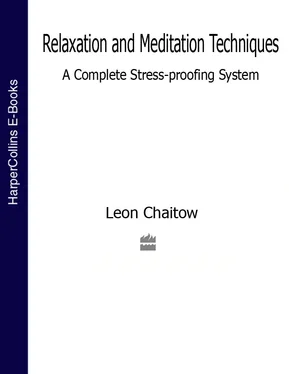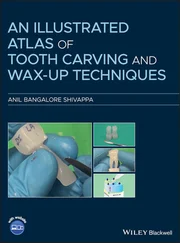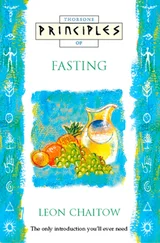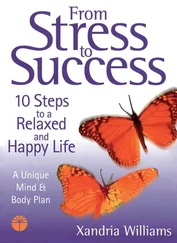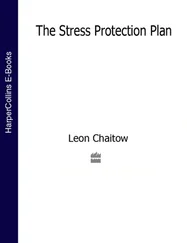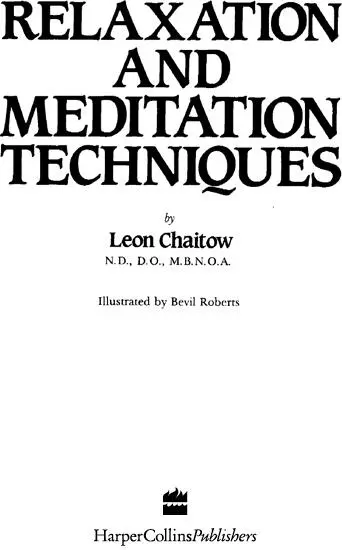
Copyright Copyright Dedication Introduction Chapter 1. The Causes and Nature of Stress 2. The Physical Effects of Stress 3. Assessing Your Stress 4. Starting to Stress-proof Yourself 5. Relaxation Exercises 6. Additional Relaxation Methods 7. Meditation 8. Using the Power of the Mind for Healing Keep Reading Acknowledgements About the Author Other Books By About the Publisher
Thorsons
An Imprint of HarperCollins Publishers
1 London Bridge Street
London SE1 9GF
www.harpercollins.co.uk
First published by Thorsons 1983
© Leon Chaitow 1983
All rights reserved under International and Pan-American Copyright Conventions. By payment of the required fees, you have been granted the nonexclusive, nontransferable right to access and read the text of this e-book on-screen. No part of this text may be reproduced, transmitted, downloaded, decompiled, reverse-engineered, or stored in or introduced into any information storage and retrieval system, in any form or by any means, whether electronic or mechanical, now known or hereafter invented, without the express written permission of HarperCollins e-books.
HarperCollinsPublishers has made every reasonable effort to ensure that any picture content and written content in this ebook has been included or removed in accordance with the contractual and technological constraints in operation at the time of publication.
Source ISBN: 9780722508654
Ebook Edition © JULY 2016 ISBN: 9780008214975
Version: 2016-08-04
RELAXATION AND MEDITATION TECHNIQUES
A practical guide to overcoming stress and common ailments through relaxation therapies, including visualization, breathing and healing techniques.
Dedication Dedication Introduction Chapter 1. The Causes and Nature of Stress 2. The Physical Effects of Stress 3. Assessing Your Stress 4. Starting to Stress-proof Yourself 5. Relaxation Exercises 6. Additional Relaxation Methods 7. Meditation 8. Using the Power of the Mind for Healing Keep Reading Acknowledgements About the Author Other Books By About the Publisher
To my darling wife, Alkmini, whose help and support made
the writing of this book possible.
Contents
Cover
Title Page
Copyright Copyright Copyright Dedication Introduction Chapter 1. The Causes and Nature of Stress 2. The Physical Effects of Stress 3. Assessing Your Stress 4. Starting to Stress-proof Yourself 5. Relaxation Exercises 6. Additional Relaxation Methods 7. Meditation 8. Using the Power of the Mind for Healing Keep Reading Acknowledgements About the Author Other Books By About the Publisher Thorsons An Imprint of HarperCollins Publishers 1 London Bridge Street London SE1 9GF www.harpercollins.co.uk First published by Thorsons 1983 © Leon Chaitow 1983 All rights reserved under International and Pan-American Copyright Conventions. By payment of the required fees, you have been granted the nonexclusive, nontransferable right to access and read the text of this e-book on-screen. No part of this text may be reproduced, transmitted, downloaded, decompiled, reverse-engineered, or stored in or introduced into any information storage and retrieval system, in any form or by any means, whether electronic or mechanical, now known or hereafter invented, without the express written permission of HarperCollins e-books. HarperCollinsPublishers has made every reasonable effort to ensure that any picture content and written content in this ebook has been included or removed in accordance with the contractual and technological constraints in operation at the time of publication. Source ISBN: 9780722508654 Ebook Edition © JULY 2016 ISBN: 9780008214975 Version: 2016-08-04
Dedication Dedication Dedication Introduction Chapter 1. The Causes and Nature of Stress 2. The Physical Effects of Stress 3. Assessing Your Stress 4. Starting to Stress-proof Yourself 5. Relaxation Exercises 6. Additional Relaxation Methods 7. Meditation 8. Using the Power of the Mind for Healing Keep Reading Acknowledgements About the Author Other Books By About the Publisher To my darling wife, Alkmini, whose help and support made the writing of this book possible.
Introduction
Chapter
1. The Causes and Nature of Stress
2. The Physical Effects of Stress
3. Assessing Your Stress
4. Starting to Stress-proof Yourself
5. Relaxation Exercises
6. Additional Relaxation Methods
7. Meditation
8. Using the Power of the Mind for Healing
Keep Reading
Acknowledgements
About the Author
Other Books By
About the Publisher
The aim of this book is to present a choice of methods, the application of which will better enable you to cope with stress. Stress itself therefore needs to be looked at, for it comes in a variety of shades and shapes. Once we understand the diverse nature of stress, and also its possible ramifications in terms of ill health and disturbed function, the importance of these methods will become apparent
Watches used to be described as ‘waterproof’. This has now been altered to ‘water-resistant’ where applicable. In stating the degree of resistance, the manufacturers have, of course, to pay due attention to both the nature of the hazard and the properties and qualities of the instrument. Such aspects would include consideration of the variations in water (salt, fresh, acid, alkaline, etc.) and also the materials and design of the watch. Finally, the watch is guaranteed resistant to water up to a certain depth (30 metres, 50 metres etc.). There are other hazards facing wrist watches, such as shock, intense heat, cold, magnetism etc. In the same way, the human condition faces a range of stress factors and it is not possible to ‘stress-proof’ anyone, absolutely. However, stress-resistance can be increased and, as in the case of the watch, attention needs to be paid to both the stress factors and all their variables as well as the instrument at risk, the human machine. The aim is therefore not to eliminate stress, but to modify it where possible and to encourage appropriate responses to it.
Health and ill health are the result of the complex interrelationship between the unique individual and the challenges and stresses of his particular internal and external environment. Stress can be a self-produced phenomenon (e.g. anger, fear) or it can be externally generated (e.g. job insecurity, an unstable marriage etc.). More usually, the stress-picture is an amalgam of internally and externally originating factors. Attitudes, beliefs, behaviour patterns, personality traits and deeply entrenched habits of thought may all be partly responsible, and several ways of examining and modifying such factors will be discussed. The importance of correct nutrition, sufficient exercise and rest, as well as such factors as adequate access to full spectrum light (daylight) will be touched on in as much as they relate to stress reduction and to our aim of stress-proofing the body. These areas are important, but the main point of this book is to show that there are defences which can be erected against stress whatever form it takes and that, by the regular application of these methods, great benefit can be derived in terms of health and well-being. We must certainly aim at reducing stress, but must also increase our resistance to it and learn to counteract its effects.
In brief, therefore, we shall examine some of the major causes of stress. This will be followed by a look at the physiological and pathological effects which prolonged stress can produce. Reference will be made to the relationship that exists between all changes in lifestyle (marriage, divorce, job changes etc.) and subsequent ill health. Knowing what constitutes stress can certainly alert us as to desirable evasive action and some consideration will be given to the roles in stress reduction of diet, exercise, rest, light etc., as well as positive suggestions relating to the changing of attitudes and coming to an understanding of those aspects of stress which are within our conscious control.
Читать дальше
